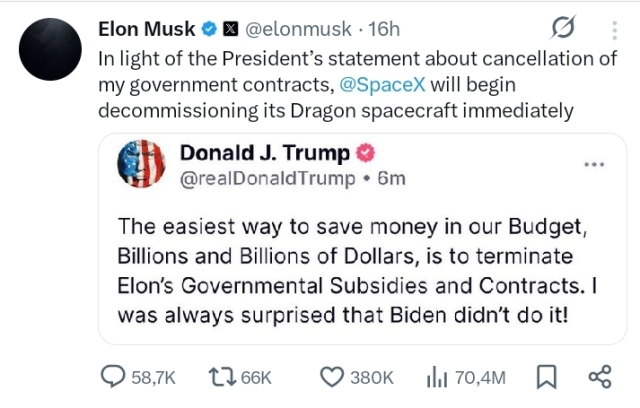Over the past fortnight or so, a dramatic and very public fallout has erupted between Elon Musk (billionaire CEO of Tesla and SpaceX) and Donald Trump, the recently re-elected president of the United States.
It is vulgar, bizarre, and deeply instructive. And while the temptation is to dismiss it as just another American melodrama, the consequences stretch well beyond Washington and Wall Street.
What we are witnessing is not merely a personal feud, but a warning about what happens when private wealth becomes entangled with state power, when political authority is auctioned off to the highest bidder, and when public institutions become bargaining chips in a game of ego.
For Zimbabwean readers who may not be following the story closely, here is the context. Donald Trump, after losing the 2020 election and being banned from major social media platforms following the January 6 Capitol riots, was politically wounded. But in 2022, Elon Musk purchased Twitter (now renamed X) and reinstated Trump’s account in the name of “free speech.” That move was more than symbolic. It gave Trump his digital megaphone back, something he desperately needed to revive his political brand.
Over the next two years, Musk became more than just a tech baron with opinions. He became a political actor, amplifying conservative voices, funding right-wing causes, and openly backing Trump’s return to the presidency.
By the time Trump was re-elected in 2024, Musk had poured untold millions into Trump-affiliated super PACs and influence operations. It was the culmination of a strange alliance: one man with the codes to the world’s algorithms, the other with access to the nuclear ones.
For a while, the arrangement seemed to work. Musk got proximity to power, favourable regulatory treatment, and the kind of access that most businessmen can only dream of. Trump got tech muscle, digital reach, and credibility with a certain breed of libertarian capitalist.
But now, the alliance is unraveling in spectacular fashion. The fallout is happening fast and in public. Trump’s flagship legislation, dubbed the “Big Beautiful Bill,” is designed to overhaul U.S. manufacturing and infrastructure. In it, however, is a sharp reversal of electric vehicle subsidies, something that Musk’s Tesla empire depends on. The bill passed with bipartisan fanfare, but Musk immediately condemned it as a betrayal. He accused Trump of abandoning innovation and clean energy, and suggested the bill was a gift to the oil lobby and legacy automakers. In response, Trump lashed out in familiar style, labeling Musk ungrateful, unstable, and a danger to American jobs. Musk, never one to back down, retaliated by suggesting that Trump’s name appears in sealed Jeffrey Epstein documents: a not-so-subtle warning that he may yet go nuclear himself.
The situation is escalating. Pro-Trump influencers on X are now openly calling for Tesla to be investigated. Republican lawmakers close to Trump are making noise about federal contracts with SpaceX. Musk, meanwhile, has begun boosting anti-Trump posts and floating the idea of supporting an independent candidate in 2028. It is a political blood feud playing out across timelines, boardrooms, and legislative corridors.
And yet, amid all the drama, there lies a deeper story, one that Zimbabwe, and indeed the entire global South, should pay close attention to. This is not merely a tale of clashing egos. It is the logical outcome of a world where billionaires have become political actors without accountability, where the lines between public policy and private interest have blurred beyond recognition, and where the rules of democracy are being rewritten in real time by men who were never elected to anything.
We are entering a phase in global politics where traditional institutions are becoming weaker than the personalities that claim to defend them. When Musk can threaten to ground NASA space missions because of a personal dispute with the president, it reveals how fragile even the most sophisticated systems can become. And when Trump can move markets by threatening federal retaliation against a private company, it shows how easily the machinery of the state can be converted into a tool of personal vengeance.
In Zimbabwe, we have seen our own versions of this dynamic, where the lines between party, state, and personal interest have blurred. We know what happens when national resources are used to settle political scores, or when entire policies are reshaped to reward loyalty and punish dissent. What makes the Musk–Trump fallout so important is not just its scale or theatricality, but the precedent it is setting for the rest of the world. If even the United States, with all its checks and balances, can be brought to heel by a billionaire-political spat, what does that say for countries with far weaker institutions?
There is also a lesson here about the dangers of over-centralized platforms. Musk’s control over X means that he now effectively moderates one of the world’s most influential information networks. This gives him the power not just to shape political discourse, but to distort it for his own interests.
As this conflict intensifies, some users on the platform have reported algorithmic bias, selective censorship, and the subtle favouring of narratives that suit Musk’s perspective. In Zimbabwe, where freedom of expression is often precarious, the centralization of digital power in the hands of unelected tech giants should concern us deeply.
The other issue is the myth of technocratic neutrality. Musk, like many tech moguls, has long portrayed himself as an innovator above politics. But his actions reveal that billionaires are not neutral actors. They have agendas, they back parties, they lobby for laws, and they punish those who cross them. In this regard, Musk is no different from the oligarchs we often criticize in other parts of the world. The only difference is that he speaks the language of disruption and innovation, rather than cronyism and corruption. But the outcome is the same: the public interest is subjugated to private empire-building.
To be clear, this is not a defense of Donald Trump. His record, both as a businessman and a president, speaks for itself. What matters here is the dynamic between public power and private capital. When they are fused together, as they were in the early stages of the Musk–Trump alliance, democracy suffers. And now that they’ve turned against each other, it is the public that is paying the price (through market instability, policy whiplash, and a deep erosion of trust).
The irony is that both men claim to be champions of the people. Trump says he represents the forgotten American worker. Musk says he is building a better future for humanity. But as their feud unfolds, we see the truth: these men are not builders of systems. They are users of systems, systems they believe should bend to their will. And when they don’t, they take their toys and go to war, leaving ordinary people to deal with the fallout.
This spectacle may be unfolding in the United States, but it offers a mirror to the rest of us. It challenges us to ask: who really governs in the modern era?
Is it elected officials? Is it corporate leaders? Or is it the algorithms that amplify some voices and silence others?
Here in Zimbabwe, where the line between government and private power has always been delicate, we must be vigilant. We must resist the seduction of strongmen, whether they wear suits or hoodies. We must insist that public institutions remain public, and that policy is shaped by debate, not by vengeance.
Ultimately, the Musk–Trump feud is a story about the collapse of boundaries: between public and private, between leadership and spectacle, between influence and impunity. It is a cautionary tale for any country tempted to treat politics as a personal enterprise or national policy as a billionaire’s experiment. In a healthy democracy, no one man, no matter how rich or popular, should be allowed to hold the system hostage.
The future will belong not to those who dominate headlines, but to those who build institutions resilient enough to withstand them. For Zimbabwe, and for many other countries watching from the sidelines, that is the real lesson. Let’s not look away.
Provided by SyndiGate Media Inc. (
Syndigate.info
).







